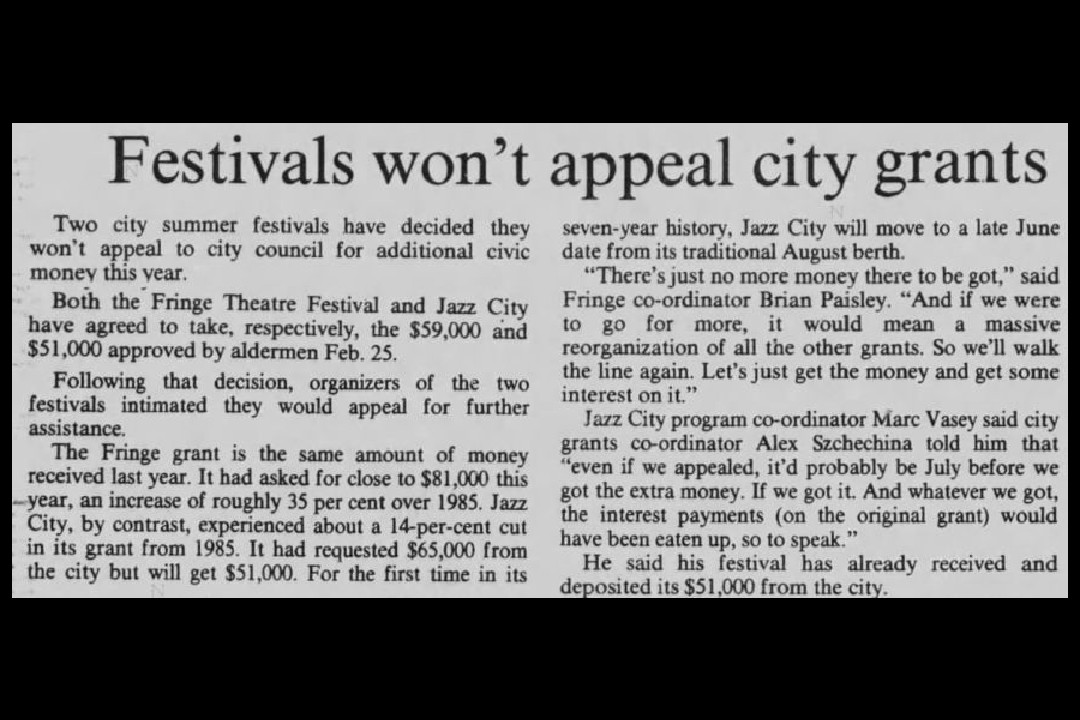On this day in 1986, Edmonton's Fringe Theatre Festival agreed to accept $59,000 of funding from the city.
The still-young festival had asked for closer to $80,000 to run the event for 1986 but accepted a lower amount with the belief that there was, in the words of founder Brian Paisley, "just no more money there to be got."
How Edmonton's famous Fringe Festival was created is a narrative filled with oddity. Paisley had newly arrived in the city. He had started the travelling Chinook Theatre company in British Columbia in the late 1970s and its success soon led to Paisley creating a permanent home for the theatre in Edmonton. Then, in 1982, the city unexpectedly offered Paisley $50,000 to produce a theatrical component for its Summerfest festival (the money was originally destined for a different theatre program before the city cut it and sent the money Paisley's way).
The funding arrived within an interesting context, too. Edmonton has long had a thriving theatre scene, but stages generally went dark in summer as it was then largely considered the off-season. There was also a lot of discontent within the city's drama community. Many artists thought the scene had become highly censored and hierarchical, with most of the power concentrated in a few organizers and funders. Paisley was among those critics and set out to use the Summerfest grant to create something more egalitarian, rebellious, and weird.
Enter 1982, and the first Fringe Festival. Paisley modelled the theatre event after the famous Edinburgh Fringe Festival, which has run since the late 1940s. Among the key tenets of both festivals was that ticket sales go directly to the artists involved.
Still, there were key differences. Unlike Edinburgh's event, where artists were responsible for securing venues, Edmonton's Fringe Festival offered facilities and support for productions. Shows were selected on a first-come, first-served basis to remove censorship or theatrical gatekeeping. That summer, the inaugural Fringe Festival opened with 200 shows running in five venues within Old Strathcona and became North America's first fringe theatre festival.
The festival was an immediate hit, selling 7,500 tickets in 1982. Subsequent years saw more enthusiasm, with attendance nearly doubling every summer. This led to long lines outside venues since tickets couldn't be purchased in advance in the early years. Rather than dampening the festivities, the queues gave theatregoers a chance to socialize. They also gave musicians, actors, and performers a captive audience. It wasn't long before the resulting street carnival atmosphere became a defining aspect of the festival.
The Edmonton Fringe Festival has always, technically, been an international event. Its first year featured a show by Brazilian puppeteers who happened to be in the city, and it grew from that point to attract artists from all over the world. In fact, nearly two dozen actors from the former Soviet Union found themselves stranded in Edmonton during the 1991 festival. They had travelled here to stage a Russian adaptation of George Orwell's Animal Farm but found themselves unable to return home thanks to an attempted coup against President Mikhail Gorbachev. Local artists took in the stranded thespians until they could return home.
While the number of shows and venues continued to grow, there was always a limit to the number of artists that could take part in the Fringe Festival. In 1992, several theatre groups staged unofficial productions at other venues during the festival. These became coined as "Bring Your Own Venue" (BYOV) shows by the festival director. Since then, BYOVs have become an integral part of the experience, and have opened the Fringe Festival to new audiences and performers.
Since its inception in 1982, Edmonton has only seen one Fringe-less year: the festival was put on hold in 2020 due to the COVID-19 pandemic. The festival returned in a scaled-down version the following year, and then celebrated its 40th anniversary in 2022. But today, 42 years after Paisley first created a defining part of Edmonton's identity, the Fringe is asking for monthly donations from supporters to prevent needing to scale back again. Indeed, without quick and substantial support, Fringe organizers say they will potentially cut a third of the 2024 festival. "It really hurts to think about what that might mean," executive director Megan Dart told CTV. "If we look at scaling our operations this year, we're looking at a long regrowth trajectory that will take us years to get back to pre-pandemic programming levels."
This clipping was found on Vintage Edmonton, a daily look at Edmonton's history from armchair archivist @revRecluse of @VintageEdmonton.

